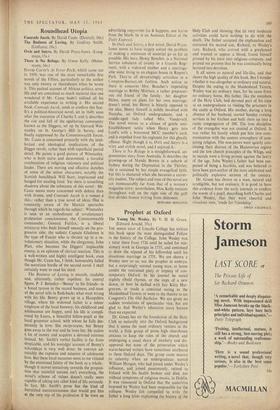Roundhead Utopia
There is No Refuge. By Gwen Kelly. (Heine- mann, 16s.)
DAVID CAUTE'S At Fever Pitch, which came out in 1959. was one of the most remarkable first novels of the Fifties, particularly as the author was only twenty or thereabouts when he wrote it This packed account of African politics, army life and sex contained so much material that one wondered if Mr. Caute hadn't utilised all his available experience in writing it. His second book, Comrade Jacob, tends to confirm this fear. It's a political-historical novel, set in 1649, soon after the execution of Charles I. and it describes the rise and fall of the egalitarian community known as the Diggers, set up by Gerrard Win- stanley on St. George's Hill in Surrey, and finally suppressed by the Commonwealth forces. Mr. Caute is concerned primarily with the intel- lectual and ideological implications of the Digger revolt, rather than with superficial period detail. He paints a good picture of Winstanley, who is both naïve and determined, a forceful combination of religious visionary and political leader. There are moving and effective sketches of some of the minor characters, notably the Scottish hunchback Will Starr, imprisoned and hanged for stealing food. Yet there is something shadowy about the substance of this novel: Mr. Caute seems more concerned with debate than with drama, and Comrade Jacob is a roman a thes2 rather than a true novel of ideas. One is constantly aware of the Marxist spectacles through which he regards his subject: Winstanley is seen as an embodiment of revolutionary proletarian consciousness; the Commonwealth commander, General Fairfax, is a liberal aristocrat who finds himself uneasily an the pro- gressive side; the sadistic Captain Gladman is the type oP Fascist who is thrown up in a re- volutionary situation; while the clergyman, John Platt, who becomes the Diggers' implacable enemy, is an epitome of clerical reaction. This is a well-written and highly intelligent book, even though Mr. Caute has, I think, honourably failed the notorious hurdle of the second novel. I shall certainly want to read his third.
The Business of Loving is smooth, readable and, ultimately, rather repellent. Its central figure, P. J. Benedict—'Benny' to his friends—is a bored tycoon in the record business, and most of the novel tells in flash-backs what went wrong with his life. Benny grows up in a Hampshire village, where his widowed father is a minor employee of the local brewery; his childhood and adolescence are happy, until his life is compli- cated by Laura, a beautiful fellow-pupil at the local grammar school, with whom he falls des- perately in love. She reciprocates, but Benny goes away to the war and he loses her. He makes a lot of money and acquires a devoted mistress instead. Mr. Smith's verbal facility is far from despicable, and his nostalgic account of Benny's schooldays is very well done; he conveys ad- mirably the raptures and miseries of adolescent love. But these local successes seem to me vitiated by the emotional falsity of the book as a whole: though it moves tentatively towards the proposi- tion that material success isn't everything, the novel's scheme of values doesn't really seem capable of taking any other kind of life seriously. In fact, Mr. Smith's prose has the kind of burnished meretriciousness that would put him at the very top of his profession if he were an
advertising copywriter (as it happens, one learns from the blurb, he is an Assistant Editor of the Daily Express).
In Owls and Satyrs, a first novel, David Pryce- Jones seems to have largely solved the problem of making a minimum of material go as far as possible. His hero, Henry Boucher, is a National Service subaltern of twenty in a Guards Regi- ment, with a widowed mother and a marriage- able sister living in an elegant house in Regent's Park. They're all devastatingly articulate in a Compton-Burnett-ish fashion. Such action as there is concerns Mrs. Boucher's impending marriage to Bobby Morisco, a rather preposter- ous old friend of the family : her daughter Helen, intent on plans for her own marriage, doesn't mind, but Henry is bitterly opposed to the idea. Henry himself is mildly involved with Natasha, an Oxford undergraduate, and a middle-aged lady called Mrs. Vandervell. The novel moves to a climax of gentle anti- Establishment satire when Henry gets into Lord's with a borrowed MCC member's card, and is expelled from his regiment for this ghastly offence. Slight though it is, Owls and Satyrs is.a witty and stylish novel, and I enjoyed it.
There is No Refuge is a straightforward. un- pretentious story from Australia. It describes the growing-up of. Mandy Brown in a suburb of Sydney during the Depression in the Thirties; she is sustained by her simple evangelical faith, but this is shattered when she becomes a univer- sity student. The subject and tone of this novel are not immeasurably far from that of a women's magazine story; nevertheless, Miss Kelly remains throughout well on the right side of the gulf that divides honest writing from dishonest.
BERNARD BER6ONZI






































 Previous page
Previous page